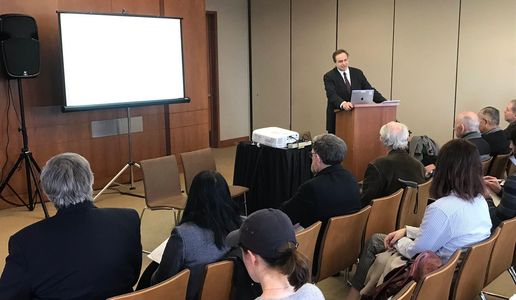BUCSA Hosts Symposium on Asia in Transition: 1919-2019
The Center for the Study of Asia (BUCSA), an affiliated regional center of the Frederick S. Pardee School of Global Studies at Boston University, hosted an April 30, 2019 symposium on “Asia in Transition: 1919-2019.” Several Pardee School faculty members spoke as part of panels at the symposium.
The symposium focused on the wrenching transition Asia faced following World War I as well as the radical changes currently facing the region.
On the 100th anniversary of the momentous events of 1919, BUCSA hosted the symposium featuring a group of leading scholars to explore the ramifications of 1919 and the connections and parallels between Asia at the start of the 20th century and today. Panelists and discussants explored how the events of 1919 shaped the dynamics in the region today and whether there are any lessons that can be learned from the past for the present. Panelists also discussed whether we are once again facing a moment in history where a fundamental transition is in the offing.
.@buasia is hosting a symposium on “Asia in Transition: 1919-2019.” #PardeeProfs Erik Goldstein and Thomas Berger are serving as moderators for panels at the symposium. pic.twitter.com/j8JzS0lUym
— Pardee School of Global Studies, Boston University (@BUPardeeSchool) April 30, 2019
The first panel of the symposium featured Antara Datta, Lecturer at Royal Holloway, University of London; Thomas Barfield, Professor of Anthropology at Boston University; and Michael Green, Professor of Modern and Contemporary Japanese Politics and Foreign Policy at Georgetown University and Senior Vice President for Asia and Japan Chair at the Center for Strategic and International Studies. Erik Goldstein, Pardee School Professor of International Relations and History, served as discussant for the panel.
The second panel of the symposium featured Yinan He, Associate Professor of International Relations at Lehigh University; Frederick Dickinson, Professor of Japanese History at the University of Pennsylvania; and Mark E. Byington, Founder and Project Director of the Early Korea Project at the Korea Institute at Harvard University. Thomas Berger, Pardee School Professor of International Relations and Director of the Center for the Study of Asia, served as a discussant for the panel.
The Center for the Study of Asia promotes comprehensive, interdisciplinary, and cross-national understanding of Asia through coordination of teaching missions, research support, community-building among faculty and students, and broad outreach beyond the university. It strives to be an intellectual hub for new ideas and cutting edge research in the humanities and social sciences.
